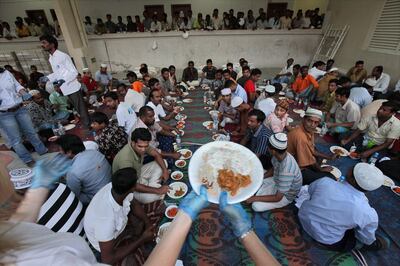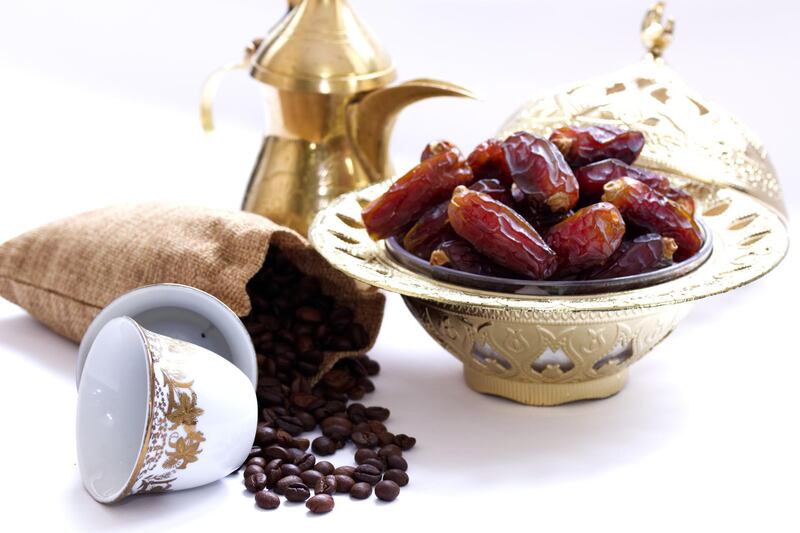For Muslims around the world, as well as many from differing cultures who are simply wanting to "try it out", Ramadan is a month of extremes when it comes to dietary routine. Fasting, widely renowned for its spiritual and physical benefits, is central to the holy month, but it's something that participants should plan for in advance if possible, or at least consider the physiological impact it will have. So we asked a number of health experts to see what each of us should be doing and, perhaps more importantly, should not be doing in order to avoid harming ourselves.
Normally it’s best to prepare for fasting by making adjustments to food and drink intake over the days leading up to Ramadan. Andrés Oppenheim, general manager at Nescens Clinique De Genolier in Switzerland, advises developing a habit of breakfasting early, to allow our metabolism to adjust to the transition. “Set your alarm for earlier than usual, wake up and eat,” he says. “The point is to make the stomach and mind used to this new routine of getting food at unusual and unexpected times.” He also recommends a reduction of caffeine to one cup of coffee a day before cutting it out altogether.
Dr Martin Zarate Lagunes, a specialist in General Internal Medicine at the same clinic, points out that fasting can have a detrimental impact on the health of some people with chronic illnesses. “Diabetics must pay particular attention to a possible imbalance with hypoglycaemia or hyperglycaemia, and should adapt their drug treatment.
The same is true for other metabolic diseases such as thyroid disease, adrenal hormones or kidney failure.” He adds that patients taking diuretics and blood pressure medication should adjust the times they administer the treatments according to their daily Ramadan hydration routine. In any case, it is probably wise to consult your doctor to be on the safe side.

Recommended foods for the holy month
Our bodies are highly complex, and any sudden change to the timings and contents of our meals is bound to have an effect, so it’s prudent to consider some of the foods and beverages that do us good after a day of fasting, as well as those that are best avoided during Ramadan.
Ali Ayman, a medical student who works as a personal trainer and is an ambassador for Sci-MX, says it's important to know how our bodies react to the changes that occur while fasting. "Ramadan consists of about 15 hours of fasting," he says, "and the time allotted to consume food or water is quite limited. Because of this, and due to the survival mechanisms of the human body, our bodies go through a few changes in order to adapt to these circumstances. These include reduction in energy consumption, slowing of metabolism to reduce dehydration and a reduction in stomach size."
As for recommended foods during Ramadan, Ayman says that breaking the fast with dates is beneficial as the sugar content restores balance to blood sugar levels and they revitalise the body. “Let’s not forget, though, that dates, like any other food, have calories, and too much can be harmful,” he cautions.
Unsurprisingly, fruit and vegetables feature highly on the good food lists of every specialist we spoke to – the fibre helps digestion and they’re packed with water, so they assist with hydration and are generally low in calories while being high in vitamins and minerals.
Protein, complex carbohydrates from oats, rice, wholegrain pasta and sweet potatoes, as well as healthy fats in the form of nuts, avocado, coconut and fish are all recommended, too. However, many buffets feature plenty of fried food, and experts warn against eating this, as well as spicy dishes during iftar and suhoor because, among many negative side effects, they increase thirst and can cause heartburn when trying to sleep.
Ayman points out that sweets, too, should be avoided because "the body needs three grams of water to absorb each gram of sugar", which is hardly ideal when a day of fasting involves no water consumption.
Being careful not to overindulge
Sirine Takieddine, a clinical dietician at Dubai’s RAK Diabetes Centre, is realistic enough to understand that, despite good intentions, the temptation to overindulge in the initial iftars might be too much to resist. “My suggestion is to let go the first two or three days of Ramadan,” she says, “given that all the family is gathered and a lot of tasty dishes and a variety of food is on display. However, after that, make sure that you adopt a more balanced diet.” She also has some advice for anyone who suffers abdominal pain after iftar.
“Split your meal into two parts,” she counsels. “Start iftar with three dates and one cup of milk or water. The liquid consumed should not be very cold, but at room temperature since cold liquid can shock your gastrointestinal tract and cause stomach pain. Give yourself a 10- to 15-minute break before starting on your main meal.”
As for suhoor, Takieddine says to avoid foods high in salt, spices and animal proteins, since they can drastically increase your thirst the following day. “High salt foods,” she points out, “include all canned foods, ready-made sauces and ready-made meals. Opt for more plant-based proteins like legumes, as they keep you full for longer.”
This is advice repeated by Muna Al Shanqiti, a dietician at Cleveland Clinic in Abu Dhabi, and Azza Aljneibi, who works there as a nutritionist. “Stay mindful of what you’re eating and fill your plate consciously, pre-deciding the amounts that you’re planning to eat,” says Al Shanqiti. “Enjoy the flavour of your meal and eat it slowly. A good rule of thumb is to have half a plate of vegetables, a quarter of a plate of protein, and a quarter of a plate of carbohydrates.”
______________
Read more about Ramadan:
All you need to know about the holy month in the UAE
2018 iftar guide: 15 to try in Dubai
2018 iftar guide: 10 to try in Abu Dhabi
______________
Meanwhile, Aljneibi reiterates the importance of hydration. “You’ve probably heard this many times over, but the best way to keep your skin and your system hydrated is from the inside. After breaking your fast, make sure to drink plenty of water and, for added freshness, drop in a few slices of cucumber or berries to give your body a dose of antioxidants.”
Perhaps all this advice can be simply condensed into the following sentence: eat healthily, drink lots of water and, for your own sake, step away from those pastries.






